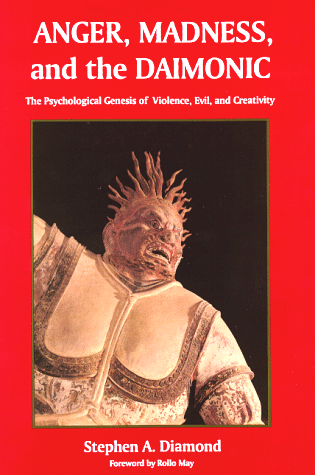Dr. Diamond is the author of the critically-acclaimed book, Anger, Madness, and the Daimonic: The Psychological Genesis of Violence, Evil, and Creativity. With a Foreword by Rollo May. A volume in the SUNY series in the Philosophy of Psychology. Michael Washburn, editor. Originally published by State University of New York Press in 1996 (hardcover and paperback), and, to mark its tenth anniversary in print, revised in 2007 to include a new Preface to the Fourth Printing by Dr. Diamond. Here is what some reviewers have to say:
"An excellent book. . . . I have always felt that Dr. Diamond's emphasis on the daimonic was extremely timely and important in our day. The myth of the daimonic covers vital, archetypal human experiences, as this work clearly illustrates. I find it very readable,, and done like the true scholar." -- from the Foreword by Rollo May
"Powerful....Fascinating....Diamond's reach is ambitious: to consider the 'meaning' of human violence and evil. . . . He asks what produces serial killers, the Oklahoma City bombing,...the O.J. Simpson murder trial, and explores more generally the male response to the rise of feminist anger. . . . Enjoyable, extremely readable and accesssible. . . . A sincere, thought-provoking contribution to an important subject."-- Journal of Analytical Psychology
"[Anger, Madness, and the Daimonic is] a brilliant and indispensible resource for students of human personality." -- Ernest Becker Foundation Newsletter
"This excellent book is unique in making sense of the 'senseless violence' that permeates American society today."-- June Singer, author of Boundaries of the Soul
"A fine book, well-written, succinct, psychologically sound, and socially relevant."-- John A. Sanford, author of Evil: The Shadow Side of Reality
"Written with great vigor, clarity, and conviction, this book is fast-paced and a pleasure to read." --George B. Hogenson, author of Jung's Struggle with Freud
BOOK CHAPTERS AND ARTICLES:
Dr. Diamond contributed a chapter, "Redeeming Our Devils and Demons," to the best-selling anthology Meeting the Shadow: The Hidden Power of the Dark Side of Human Nature, edited by Jeremiah Abrams and Connie Zweig, and published by Tarcher/Putnam/Penguin books in 1991.
Dr. Diamond contributed a chapter, "Violence as Secular Evil," to the textbook Forensic Psychiatry: Influences of Evil, edited by Tom Mason, and published by Humana Press in 2006. This was a revised version of an article originally published in the Journal of Applied Psychoanalytic Studies in 2003 titled "Violence as Secular Evil: Forensic Evaluation and Treatment of Violent Offenders from the Viewpoint of Existential Depth Psychology."
Dr. Diamond contributed a chapter to the book Spirituality and Psychological Health, edited by L. Hoffman, R. Cox and B. Ervin-Cox, and published by Colorado School of Professional Psychology Press in 2005.
Dr. Diamond contributed several essays, including entries on "Existential Psychotherapy," Jung's notion of the "Shadow," and Rollo May's concept of the "Daimonic" to the Encyclopedia of Psychology and Religion, published by Springer Verlag in 2009.
ANNOUNCEMENT:
Dr. Diamond (2013) published a slightly revised electronic edition of his book, titled Anger, Madness and the Daimonic: The Paradoxical Power of Rage in Violence, Evil and Creativity. It is now available for Kindle, Nook and other readers. The paperback can still be purchased online from amazon.com, (click on cover), barnesandnoble.com or directly from SUNY Press.
In addition, his chapter "Existential Therapy: Confronting Life's Ultimate Concerns" was published in the textbook Contemporary Theory and Practice in Counseling and Psychotherapy (SAGE, 2016), as well as his entry on Rollo May and "Existential Therapy" in the SAGE Encyclopedia of Theory in Counseling and Psychotherapy (2015).
Dr. Diamond contributed a chapter titled "Why We Love Music--and Freud Despised It" to the Bedford Spotlight Reader on Writing Music (Bedford/St. Martin's, 2018), edited by Jeff Ousborne.


